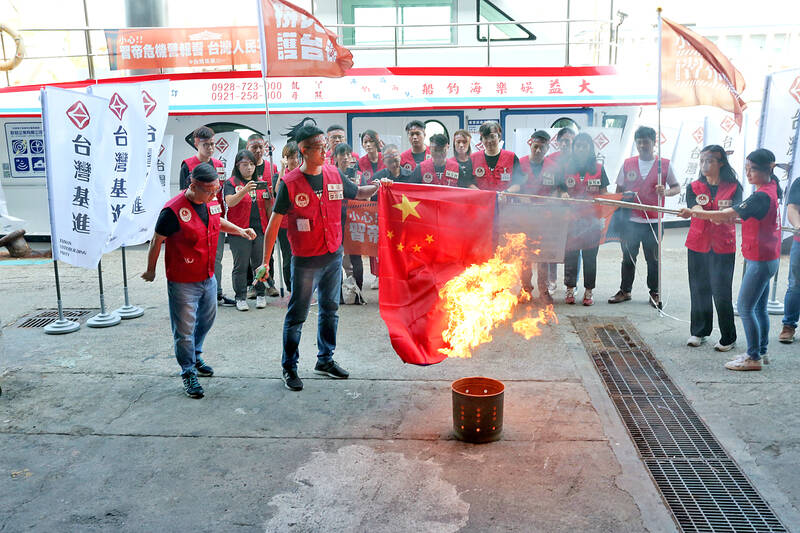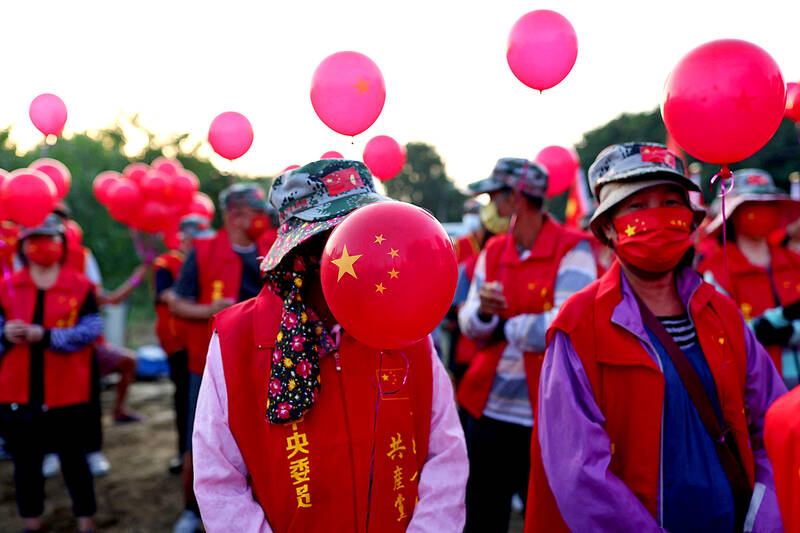Two small Taiwanese groups at the far ends of the debate over relations with Beijing marked the National Day of the People’s Republic of China yesterday with flag raisings and flag burnings — opposite responses at a time of rising tension over the Taiwan Strait.
Oct. 1 marks the day that Mao Zedong (毛澤東) proclaimed the People’s Republic of China in 1949, with the defeated Republic of China government fleeing to Taiwan at the end of that year, where — after democratic reforms — it remains to this day, neither recognizing the other.
China’s national day is not officially marked in any way in Taiwan, which celebrates its National Day, the founding of the Republic of China, on Oct. 10.

Photo: Ko Yu-hao, Taipei Times
However, some small groups in Taiwan do mark China’s national day, with either pride at being Chinese or fury at Beijing’s threats against Taiwan, especially after China stepped up war games near Taiwan in August.
In a rural part of Tainan, the Taiwan People’s Communist Party gathered about 200 people, mostly older people, to sing China’s national anthem and raise the country’s flag on what the party referred to in a statement as “a sacred part of China’s territory.”
Lin Te-wang (林德旺), the chairman of the fringe party, which has no elected officials, said that China is not a threat, despite August’s large-scale military activities, which were condemned by all of Taiwan’s mainstream parties.

Photo: Reuters
“Military exercises are good for Taiwan because they show the majesty of China’s military force internationally,” Lin, 67, said.
At the other end of the spectrum, the pro-independence Taiwan Statebuilding Party burned a Chinese flag yesterday on a boat off Taiwan’s south coast, in an area of sea where China staged its August drills, shouting slogans such as “protect Taiwan to the death.”
Party Chairman Chen Yi-chi (陳奕齊), while on the boat in the Taiwan Strait, said that burning the flag was not provocative.
“How can burning the flag be extreme? If you want to show your resistance to defending Taiwan now, if burning the flag is extreme, what will you do when the artillery fire comes?” Chen said.

Taiwan is to commence mass production of the Tien Kung (天弓, “Sky Bow”) III, IV and V missiles by the second quarter of this year if the legislature approves the government’s NT$1.25 trillion (US$39.78 billion) special defense budget, an official said yesterday. Commenting on condition of anonymity, a defense official with knowledge of the matter said that the advanced systems are expected to provide crucial capabilities against ballistic and cruise missiles for the proposed “T-Dome,” an advanced, multi-layered air defense network. The Tien Kung III is an air defense missile with a maximum interception altitude of 35km. The Tien Kung IV and V

The disruption of 941 flights in and out of Taiwan due to China’s large-scale military exercises was no accident, but rather the result of a “quasi-blockade” used to simulate creating the air and sea routes needed for an amphibious landing, a military expert said. The disruptions occurred on Tuesday and lasted about 10 hours as China conducted live-fire drills in the Taiwan Strait. The Civil Aviation Administration (CAA) said the exercises affected 857 international flights and 84 domestic flights, affecting more than 100,000 travelers. Su Tzu-yun (蘇紫雲), a research fellow at the government-sponsored Institute for National Defense and Security Research, said the air

A strong continental cold air mass is to bring pollutants to Taiwan from tomorrow, the Ministry of Environment said today, as it issued an “orange” air quality alert for most of the country. All of Taiwan except for Hualien and Taitung counties is to be under an “orange” air quality alert tomorrow, indicating air quality that is unhealthy for sensitive groups. In China, areas from Shandong to Shanghai have been enveloped in haze since Saturday, the ministry said in a news release. Yesterday, hourly concentrations of PM2.5 in these areas ranged from 65 to 160 micrograms per cubic meter (mg/m³), and pollutants were

Taiwan lacks effective and cost-efficient armaments to intercept rockets, making the planned “T-Dome” interception system necessary, two experts said on Tuesday. The concerns were raised after China’s military fired two waves of rockets during live-fire drills around Taiwan on Tuesday, part of two-day exercises code-named “Justice Mission 2025.” The first wave involved 17 rockets launched at 9am from Pingtan in China’s Fujian Province, according to Lieutenant General Hsieh Jih-sheng (謝日升) of the Office of the Deputy Chief of the General Staff for Intelligence at the Ministry of National Defense. Those rockets landed 70 nautical miles (129.6km) northeast of Keelung without flying over Taiwan,